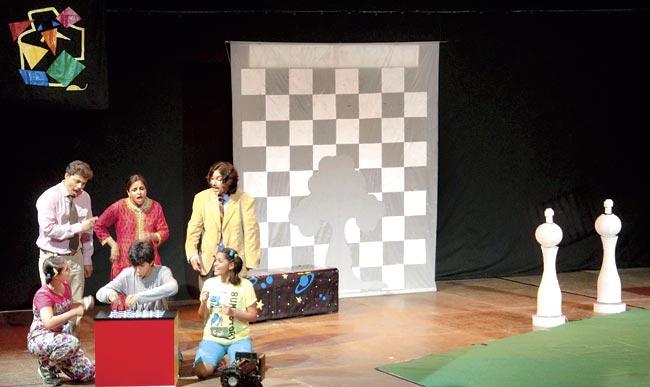A children’s play, The Boy Who Stopped Smiling, was staged in 1998, written by Ramu Ramanathan, directed by Jaimini Pathak and produced by Little Prithvi Players (which, sadly, didn’t survive too long)

 A children’s play, The Boy Who Stopped Smiling, was staged in 1998, written by Ramu Ramanathan, directed by Jaimini Pathak and produced by Little Prithvi Players (which, sadly, didn’t survive too long).
A children’s play, The Boy Who Stopped Smiling, was staged in 1998, written by Ramu Ramanathan, directed by Jaimini Pathak and produced by Little Prithvi Players (which, sadly, didn’t survive too long).
It went on to become one of the most successful children’s plays, and has been revived this summer by Pathak, who had played the lead in the earlier production and now plays the older and wiser Dr Buskute.
The play, even more topical today, was what the title stated a little boy called Malhar (now played by Anshuman Jha), who suddenly stops smiling one day, and speaks in sullen, incomprehensible sentences.

The play, The Boy Who Stopped Smiling, makes parents look faintly ridiculous and totally clueless, which is what kids in the audience found most amusing
Simply put, Malhar has a problem communicating with his overwrought parents (Padma Damodaran-Mandar Gokhale) and the parents are at their wits’ end, because they don’t know how to deal with the problem.
Only his chessboard animates the kid, or the incessant chattering of his sister Mallika (Manjiri Pupala) and her drama queen friend Ashwini (Scherezade Kaikobad).
Malhar is crazy about chess and dreams of playing against Vishwanathan Anand, while around him, in the normal routine of a middle-class home, there is no place for offbeat dreams if the child is good at maths, then he should grow up to be a financial advisor.
Since then, other plays, and one hit film 3 Idiots have raised the very same issue, of parents pressuring their children to follow a pre-ordained path. The Boy Who Stopped Smiling caught the problem much before it took on such monstrous dimensions. Children feel the heat of their parent’s ambitions and are not allowed to think for themselves.
The Boy Who Stopped Smiling is done in the Grips style, a form of theatre founded by Volker Ludwig in Germany, which deals with children’s issues and has adults playing the roles of children.
This ensures longevity for the production, since kids are caught up with school most of the year; it is also very challenging for grown-ups to play children convincingly, and it they do, they make an immediate connection with kids in the audience. Mohan Agashe and Srirang Godbole introduced Grips Theatre in India over 25 years ago, and since then the style has caught on.
Also, over the years, children’s theatre has grown exponentially there are new productions during every vacation and a lot of theatre groups in Mumbai now work regularly with children’s theatre Jaimini Pathak’s Working Title, Akash Khurana’s Akvarious, Trishla Patel’s T-pot, Choiti Ghosh’s Tram Theatre to name a few, do children’s plays regularly and Shaili Sathyu’s Gillo Repertory works exclusively with children.
Parents and schools have begun to see the value in getting kids involved with culture at a young age, and many schools have active drama departments. During the vacations, there is an explosion of activities for children all over the city and two full-fledged summer festivals at the NCPA and Prithvi Theatre — the latter, under Sanjna Kapoor, being a pioneering force in children’s theatre.
The Boy Who Stopped Smiling, one of the earliest hits, eschewed the fairy tale-folk tale route that so many children’s plays took, and created something that kids would understand and identify with, for which spirited kid has not had a run-in with parents over what they would like to do, over what is imposed on them by adults.
Malhar in the play calls parents “Enemy Camp,” and the doctor who is summoned to help him, is called “Boss of the Enemy Camp.” Even though he and his sister Mallika are always quarreling, like most siblings do, she is on his side, and along with Ashwini with her overactive imagination, they cook up elaborate stories to drive the doctor away. But it is the friendly doc who figures just why Malhar stopped smiling and solves the problem.
The play makes parents look faintly ridiculous and totally clueless, which is what kids in the audience found most amusing. Today, with so many influences thrown at the child, it is difficult for parents to keep up with their children, and if the child happens to be more intelligent or focused than normal, then the parents are thrown even more off balance.
All they can think about is what is good for the child which, the child might not agree with. But then, a child may not know what is right for her/him either and that can cause a good deal of angst all round.
Gone are the days with kids would obey their parents unconditionally; now parents seem to scurry around nervously trying to please their disgruntled children. As the sensible Dr Buskute says, everybody can be a parent, but everybody does not know how to be a parent.
Deepa Gahlot is an award-winning film and theatre critic and an arts administrator. She tweets at @deepagahlot
 Subscribe today by clicking the link and stay updated with the latest news!" Click here!
Subscribe today by clicking the link and stay updated with the latest news!" Click here!







